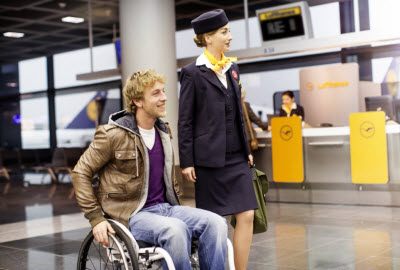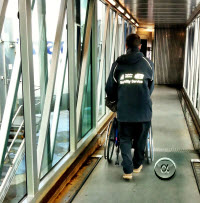You have done your homework and pre-booked wheelchair assistance on time and yet the service is not there when you need it. This is irritating and frustrating at the same time.
Passengers are prone to believe airport services are understaffed but, in most cases, this is not the real reason they are left waiting. Sometimes demand supersedes availability due to the large number of passengers requiring the service upon the arrival of the aircraft.
Research conducted by Heathrow airport and IATA in 2019 unearthed the real reasons behind the misuse of wheelchair service and identified ways to solve the problem.
Two out of ten arriving passengers (20% of the total sample) said they booked or requested wheelchair assistance non on grounds of disability but because they needed help carrying their bags or needed help to navigate the airport environment (lack of familiarity or illiteracy).
Pre-pandemic, Heathrow airport assisted around 5.000 passengers per day. Given these findings, around 1.000 passengers per day misused wheelchair assistance for reasons that had nothing to do with their inability to walk.
Having identified points of origin from where more than 20 per cent of passengers misused the service, the airport offered an alternative escort service to connecting flights or the baggage hall.
alternative escort service to connecting flights or the baggage hall.
A remarkable 84 per cent of passengers who trialled the alternative service said they would choose to use it again in the future as they found it to be a better alternative to wheelchair assistance.
Cutting requests by 20 per cent would allow passengers who genuinely need wheelchair assistance to be helped on time.
Research conducted by Reduced Mobility Rights between 2018 and 2019 found that a significant number of passengers with Alzheimer’s or dementia but otherwise fit to walk incorrectly request wheelchair assistance. Root causes for this behaviour reside in their unwillingness to declare their condition and their relatives’ misbelief passengers would be better assisted.
Airports across the world developed safe procedures to assist passengers with dementia. But these processes are not triggered unless they are made aware the person has this condition.
Truth be told, requesting wheelchair assistance for a fit to walk dementia sufferer poses significant personal risks for the individual who may wander off and become disoriented and lost without staff knowing the real reasons for this behaviour.
Booking the right type of assistance not only helps people be better cared for but also ensures services are equally available to others in need.
 Occasionally, passengers who pre-book wheelchair assistance at airports are left waiting longer than they should without knowing why this happens.
Occasionally, passengers who pre-book wheelchair assistance at airports are left waiting longer than they should without knowing why this happens. alternative escort service to connecting flights or the baggage hall.
alternative escort service to connecting flights or the baggage hall.









